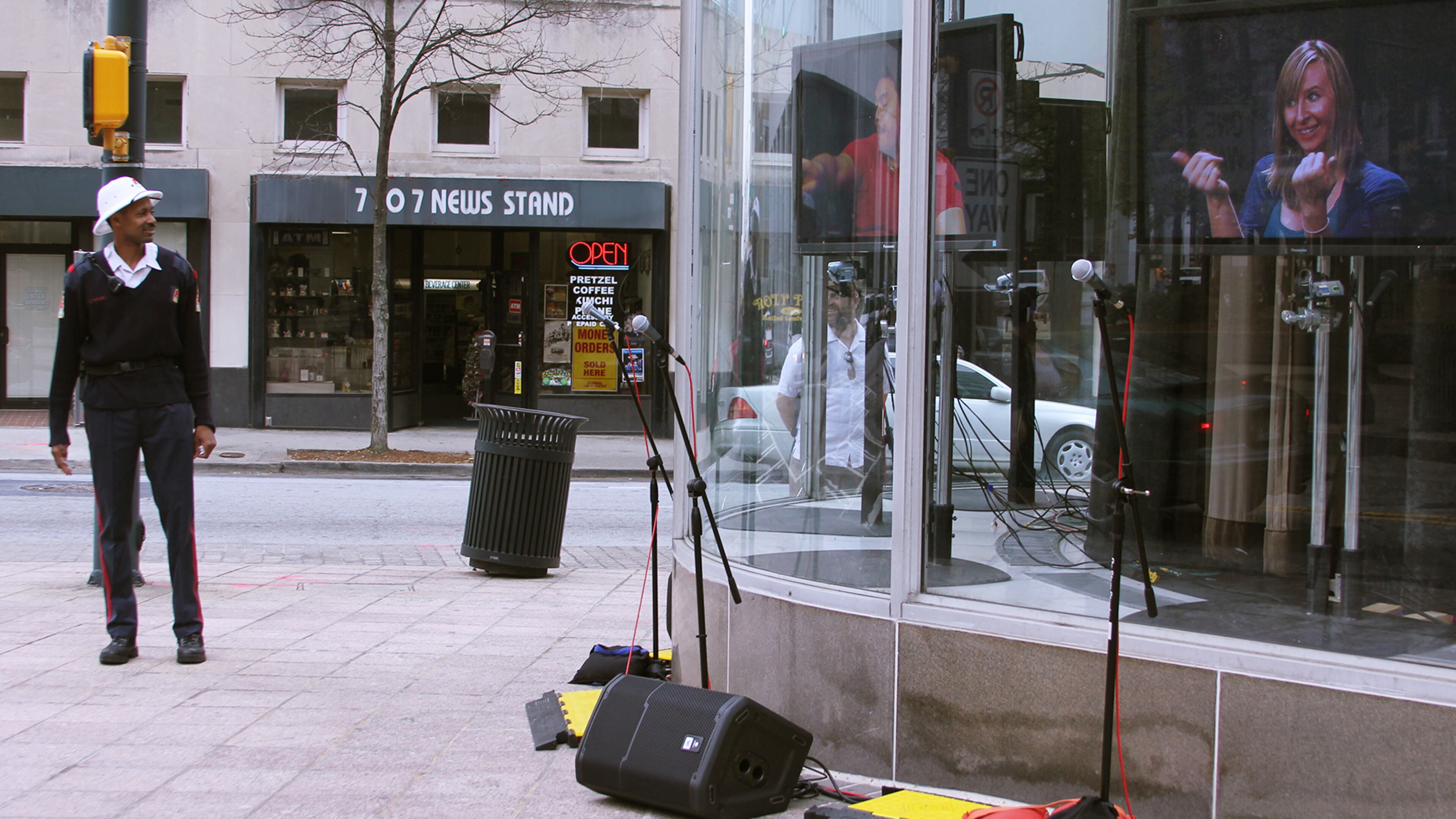Empathy training for men through art

Catcalling is a behavior predominantly directed at women by heterosexual men. So what happens if the roles are reversed?
In March 2011, Flux Projects presented “I Go Humble …,”an interactive public-art installation by Stefani Byrd and Wes Eastin during which two women and two gay men catcalled straight men for nine hours in downtown Atlanta.
The artists devised a structure for the project and selected four improv actors as performers. They were stationed inside the studio at the Digital Arts Entertainment Lab at Georgia State University, at the southeast corner of Woodruff Park, an area traversed by business people, college students and a fair number of homeless persons.
Performers and passersby interacted in real time through a two-way video system. The faces of the performers were seen on video monitors in the picture windows, and their voices were heard through speakers. Performers watched passersby on television monitors inside the studio, and people could stop and speak back to them through microphones.
Typical of Byrd and Westin’s collaborations, there was an element of play. Byrd likens it to using candy to lure people into participating, using humor to disguise the seriousness of the subject matter. The performers were funny and good-natured in their advances as they pulled people into the project. With a public work of this nature, you can never be certain what will happen. You carefully plan what you can, then, as Byrd says, “You place the work in public space and watch what happens.”
So what happened? We found many men liked being catcalled; they saw it more as flattery than harassment. Granted, people on a video monitor may not seem threatening. The screen mediates the experience; they are not actually able to approach you. This removes the threat of violence that women often experience when sharing a physical space with their harassers. Yet even in real life, it’s been noted that a man is unlikely to experience the same fear of being physically overpowered that a woman does.
The four performers managed to walk a fine line, delivering calls and requests that were quick, funny and smart, never degrading. This too had its consequences.
Many of the men laughed, acknowledged the invitations and even responded to requests to bend over or take off their coats; others took the microphones as invitations to engage. The female performers were asked for their phone numbers and when they would be leaving. Even across the video monitors, they felt their safety challenged at times. At the end of the project, they were uneasy stepping out onto the street, so they slipped into disguises, left out the back, and were escorted to their cars.
Not all conversations were negative. Some people saw the project as an opportunity simply to talk to someone — something they were craving out of loneliness, lack of friends in a new city, or intrigue.
Byrd refers to her work of this nature as “empathy training … putting people on the opposite end of inappropriate behavior so they can experience it for themselves.” In the case of “I Go Humble …,” did it work? Given the nature of the project, we will never know the impact it had on most of the guys, but one did take the time to share his impressions. Visibly moved by the experience, he confessed to having engaged in the same behavior when he was younger and now being filled with regret.
For the past five years, Flux Projects has been placing temporary public art on the streets of Atlanta. The best of these have contained an element of surprise and sparked people to reconsider public spaces and personal ideas. There is also a magic that keeps us talking about them long after they are over. That’s been the case with “I Go Humble …” — which, coincidently, took place the day after the first-ever Anti-Street Harassment Day.
We had selected the timing of the installation by comparing the schedules of the performers with the availability of the site; we had never heard of Anti-Street Harassment Day until a few days before the project went live. Byrd was contacted by Hollaback! an organization and international movement to end street harassment. Sometimes, things just align.
Anne Archer Dennington is executive director of Flux Projects.
